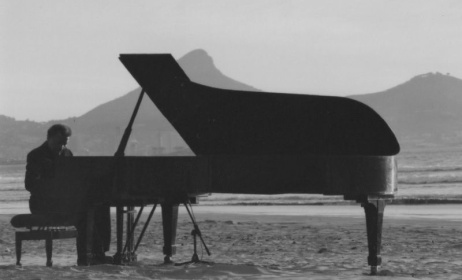Zonke: Mistress of her own destiny
By Hagen Engler
In an industry awash with talent, but with the production side dominated by a stubbornly male establishment, South African R&B artist Zonke has taken charge of her own music, writing, producing, arranging and recording her own songs.
 Zonke is among the best female musicians in South Africa.
Zonke is among the best female musicians in South Africa.
Too often a female artist is seen as the project of a male svengali or impresario. They are “discovered”, “launched” and then he “makes them a star”. At some point the artist might become frustrated and attempt to assert her independence. What this often means is moving on to another producer who gives her a “new sound”.
South African R&B artist Zonke is not above this phenomenon – she has lived that process from the inside. At best it amounts to a juniorisation of woman artists – at worst it’s exploitation. But she has subverted this process magnificently.
Zonke Dikana, who comes from a musical family in South Africa’s coastal city of Port Elizabeth, was never going to be exploited. Her father Viva (subject of the classic track ‘Viva The Legend’) imbued her with the talent and inspiration. Her stepmother, Anneline Malebo of Eighties pop powerhouse Joy, taught her to hustle.
“When I moved up to Joburg in the late ‘90s, Anneline took me under her wing,” Zonke says. “Every day we’d go out to sessions and record backing vocals for artists like Letta Mbulu, Rebecca and Chicco Twala. We’d hang around the studio, then when they needed us, we’d have to step into the booth and do the vocal in a few minutes.”
It taught Zonke pop chops. “I’m the 20-minute girl,” she says. “I can write a hook and record it that quickly.”
Zonke lent her writing skills to a host of other artists, penning tracks for the likes of Bongo Maffin, Thebe, Mafikizolo and TK.
Her first taste of fame was when she was discovered by German producer York to be part of German group Culture Clan. They released two albums but Zonke’s urge for self-actualisation was strong. She went solo, releasing the album Soulitary, which did well in Japan. Her international career looked promising. But Zonke was not satisfied. “I could not imagine making it globally but being unknown at home. So I came back to South Africa,” she said.
Back to the hustle of songwriting and BV sessions on the Joburg music scene. This brought her to the attention of Kalawa Jazmee boss Oskido, who signed her and released the house-inflected Life, Love ‘n Music album, which spawned the hit ‘Ekhaya’. Again Zonke jumped ship, preferring to shape her own destiny.
“I had a vision for a soul-R&B album, with lots of strings. I needed to produce it myself, I needed to move away from the Kalawa dance sound.”
Signing with the independent TMP label, this was Zonke’s last throw of the dice. She moved to Cape Town and spent four months writing, arranging and producing the sultry follow-up. It was the breakthrough smash she was destined to make, going double platinum, winning a SAMA and a Metro award and releasing a DVD as well as a live album that achieved similarly spectacular sales in a declining CD market.
And now here she stands. An independent woman, writing, arranging and producing her own smash hits. Her latest album, Work Of Heart, went platinum last year and won a SAMA or Best Female Artist.
Zonke has taken up residence at the top of the charts. It’s a rare position in South African pop music, one reserved for only those who find their way into the people’s hearts: Brenda, Letta, Hugh Masekela, Mafikizolo. Other artists are granted only a temporary stay.
“The South African music scene is strange,” Zonke says. “Few artists have sustained success. If you win big, you’re a trend. The background is the township culture of sharing. It’s almost like we’re saying, "We’ve struggled enough, so we must each have a turn’.”
But Zonke’s turn goes on. As far as SA music is concerned, she’s a keeper. And while she is every inch a product of that scene, she has taken ownership of her career, her sound and created an independent success story that is beholden to no one.

























Commentaires
s'identifier or register to post comments